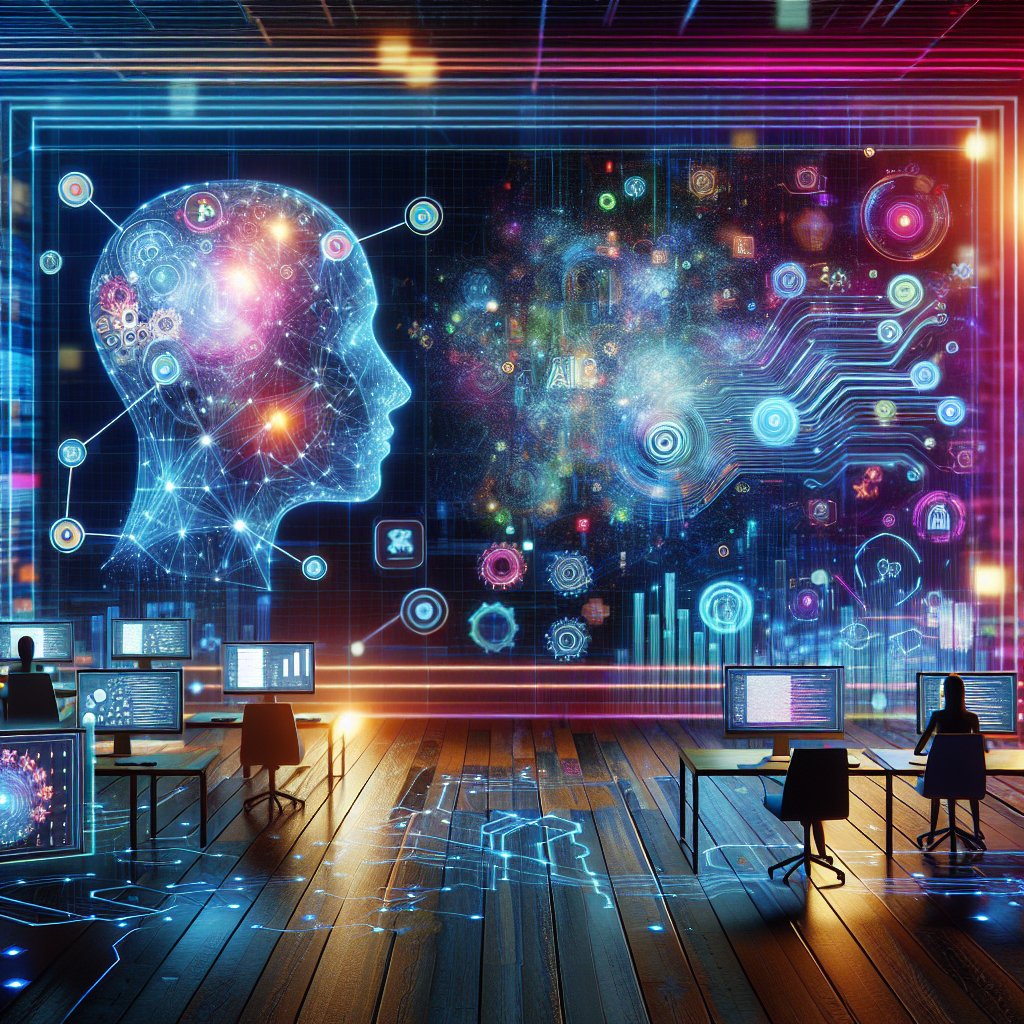Google’s AI has revolutionized the advertising world, making it more efficient and personalized than ever before. With advanced machine learning algorithms and data analysis capabilities, Google’s AI can target and reach the right audience with the right message, driving higher engagement and conversion rates. This article explores the profound impact of Google’s AI on advertising, discussing its powerful features and how it has transformed the way businesses promote their products and services.

Google’s AI in Advertising
Overview of Google’s AI technology
Google’s AI technology has revolutionized the advertising industry with its advanced capabilities and smart algorithms. By leveraging machine learning and deep neural networks, Google has created a powerful tool that can analyze vast amounts of data and generate valuable insights for advertisers. This article explores the various ways in which Google’s AI is reshaping the advertising landscape, from enhanced ad targeting to fraud detection and prevention.
The role of AI in advertising
Artificial Intelligence plays a crucial role in advertising by enabling advertisers to reach the right audience with the right message at the right time. With AI algorithms, advertisers can analyze user data, generate personalized ad content, optimize ad performance, streamline campaign management, detect and prevent ad fraud, improve ad attribution, enhance user experience, and leverage the growing popularity of voice search. AI helps advertisers make data-driven decisions and deliver more effective and engaging ads, ultimately maximizing their return on investment.
Advantages of using AI in advertising
Using AI in advertising offers numerous advantages for both advertisers and consumers. For advertisers, AI-powered tools provide improved ad targeting, better ad creatives, ad performance optimization, streamlined campaign management, fraud detection and prevention, improved ad attribution, enhanced user experience, and the ability to tap into the potential of voice search. On the other hand, consumers benefit from receiving more personalized and relevant ads, leading to a better overall advertising experience. The use of AI in advertising ensures that advertisers can connect with their target audience in a more meaningful and effective way.
Enhanced Ad Targeting
Using AI to analyze user data
Google’s AI technology allows advertisers to analyze vast amounts of user data, including demographic information, browsing behavior, and purchasing patterns. By harnessing the power of AI, advertisers can gain valuable insights into user preferences, interests, and intents. This enables them to target their ads to the most relevant audience segments, ensuring that their messages resonate with potential customers.
Personalized ad experiences
AI enables advertisers to provide personalized ad experiences tailored to individual users. By leveraging user data and machine learning algorithms, AI can present ads that align with users’ preferences, interests, and browsing history. Personalized ads not only capture users’ attention but also increase the likelihood of engagement and conversion. Advertisers can deliver customized messages that speak directly to the needs and desires of each user, fostering a stronger connection between the brand and the audience.
Improved ad targeting algorithms
Google’s AI technology continuously improves its ad targeting algorithms through machine learning. By analyzing user interactions, ad performance, and other relevant data, AI algorithms can refine and optimize the targeting process. This ensures that advertisers can reach the most relevant audience segments with precision and efficiency. The enhanced ad targeting capabilities offered by AI result in higher click-through rates, improved conversion rates, and better overall campaign performance.
Better Ad Creatives
Using AI to generate ad content
AI tools provided by Google empower advertisers to generate ad content that resonates with their target audience. By analyzing user data and understanding their preferences, AI algorithms can generate compelling ad creatives that capture attention and drive engagement. Advertisers can utilize AI-generated content to deliver personalized messages that connect with users on a more meaningful level, increasing the effectiveness of their advertising campaigns.
Dynamic ad creation
AI enables dynamic ad creation, where ads can be automatically tailored to each individual user. By harnessing the power of AI, advertisers can create multiple variations of their ads, each targeting specific user segments based on their preferences and behaviors. This allows for a more personalized ad experience that adapts to the needs and interests of each user, ultimately leading to higher engagement and conversion rates.
Automated A/B testing for ads
AI technology also enables automated A/B testing for ads, allowing advertisers to optimize their creative strategies. By automatically testing different versions of ads and analyzing user responses, AI algorithms can determine which variations perform better in terms of click-through rates, conversion rates, and other key metrics. This data-driven approach to ad testing helps advertisers make informed decisions about their creative elements, ensuring that their ads are continuously optimized for maximum effectiveness.
Ad Performance Optimization
AI-powered bid management
Google’s AI technology offers powerful bid management capabilities that optimize ad performance. AI algorithms analyze historical data, user behavior patterns, and market conditions to determine the optimal bid strategy for each ad placement. By automatically adjusting bids in real-time, AI ensures that advertisers can maximize their return on investment and achieve their desired advertising goals while staying within budget. AI-powered bid management streamlines the process of bid optimization and improves the overall efficiency of ad campaigns.
Real-time ad performance evaluation
With AI, advertisers can track and evaluate the performance of their ads in real-time. AI algorithms monitor key metrics such as click-through rates, conversion rates, and engagement levels, providing advertisers with up-to-date insights into the effectiveness of their campaigns. Real-time ad performance evaluation allows advertisers to make timely adjustments and optimizations to their ads, ensuring that they are always delivering the best possible results.
Optimizing ad placement
AI technology enables advertisers to optimize ad placement across different platforms and channels. By analyzing user data, audience demographics, and contextual information, AI algorithms can determine the most effective ad placements that maximize visibility and engagement. Whether it’s on search engines, social media platforms, websites, or mobile apps, AI helps advertisers make data-driven decisions about ad placement, leading to improved campaign performance and higher ROI.

Streamlining Ad Campaign Management
Automated campaign setup and optimization
AI streamlines the process of setting up and optimizing ad campaigns. With AI-powered tools, advertisers can automate various tasks such as keyword selection, bidding strategies, and budget allocation. This not only saves time and effort but also ensures that campaigns are set up to maximize performance from the start. AI algorithms continuously optimize campaigns based on real-time data, allowing advertisers to focus on high-level strategy and decision-making.
AI chatbots for campaign management
AI chatbots offer an efficient way for advertisers to manage their ad campaigns. These virtual assistants leverage natural language processing and machine learning to understand and respond to advertisers’ queries and requests. AI chatbots can provide real-time campaign updates, performance insights, and recommendations, making campaign management more seamless and convenient. Advertisers can rely on AI chatbots to handle routine tasks, answer questions, and provide valuable assistance throughout the campaign lifecycle.
Predictive analytics for campaign success
AI-powered predictive analytics helps advertisers forecast campaign success and make data-driven decisions. By analyzing historical data, market trends, and consumer behavior patterns, AI algorithms can predict the performance and outcomes of ad campaigns. This enables advertisers to adjust their strategies, budgets, and targeting techniques to optimize their chances of success. Predictive analytics empowers advertisers to make informed decisions that maximize their ROI and drive campaign success.
Fraud Detection and Prevention
Using AI to identify and prevent ad fraud
AI technology plays a crucial role in identifying and preventing ad fraud. By analyzing vast amounts of data and detecting patterns, AI algorithms can identify fraudulent activities such as bot traffic and click fraud. AI-powered fraud detection systems continuously monitor ad campaigns and automatically flag suspicious activities. This allows advertisers to take prompt action to mitigate fraud and protect their ad spend.
Detecting click fraud
Click fraud is a major concern for advertisers, as it can drain their budget and distort campaign performance metrics. AI algorithms can analyze click patterns, user behavior, and other relevant data to detect and distinguish legitimate clicks from fraudulent ones. By leveraging machine learning, AI can learn from historical data and identify patterns associated with click fraud, allowing advertisers to take proactive measures to prevent fraudulent clicks and ensure the integrity of their ad campaigns.
Monitoring invalid traffic
AI-powered systems can also monitor and detect invalid traffic, such as non-human traffic and traffic from low-quality sources. By analyzing various data points and utilizing algorithms, AI can identify traffic that does not align with typical user behavior. This ensures that advertisers’ ads are displayed to genuine users, maximizing their chances of engagement and conversion. Monitoring invalid traffic helps advertisers maintain the quality and effectiveness of their ad campaigns.

Improving Ad Attribution
AI-based multi-touch attribution models
Ad attribution is a critical aspect of measuring the success of advertising campaigns. AI-based multi-touch attribution models help advertisers determine the most effective touchpoints along the customer journey that lead to conversions. By analyzing user data and applying advanced algorithms, AI can allocate credit to each interaction, providing advertisers with a holistic view of the impact of their ads. AI-based attribution models allow for more accurate and comprehensive analysis of campaign performance, helping advertisers optimize their marketing strategies.
Determining the most effective touchpoints
AI algorithms can identify the touchpoints that have the highest impact on user actions and conversions. By analyzing user paths, engagement levels, and other relevant data, AI can determine which touchpoints are most influential in driving desired outcomes. This insight helps advertisers allocate resources and optimize their advertising efforts to focus on the most effective touchpoints, ensuring that their campaigns are as impactful as possible.
Accurate campaign performance measurement
AI technology enables more accurate measurement of campaign performance. By leveraging AI algorithms, advertisers can obtain precise metrics and insights into the effectiveness of their ads. AI can analyze user engagement, conversion rates, and other key performance indicators to provide advertisers with a comprehensive view of how their campaigns are performing. Accurate campaign performance measurement allows advertisers to make data-driven decisions and continuously optimize their advertising strategies for better results.
Enhancing User Experience
AI-powered recommendations
AI technology enables personalized recommendations that enhance user experience. By analyzing user data, AI algorithms can identify users’ preferences, interests, and browsing behaviors to offer tailored recommendations. This applies not only to product recommendations but also to content suggestions and ad placements. AI-powered recommendations enhance user experience by delivering content and ads that are highly relevant and engaging, creating a more personalized and satisfying browsing experience.
Personalized product suggestions
AI algorithms can analyze user behavior and purchasing patterns to provide personalized product suggestions. By understanding users’ preferences and interests, AI can recommend products that align with their individual tastes. This level of personalization improves the overall shopping experience for users, increasing the likelihood of conversion and building customer loyalty. Personalized product suggestions empower advertisers to showcase their offerings to users who are most likely to be interested, maximizing the impact of their ads.
Customized user interfaces
AI technology can also customize user interfaces based on individual preferences and needs. By leveraging AI algorithms, websites and applications can adapt their interfaces to provide a personalized experience for each user. This includes adjusting layout, color schemes, content placement, and other elements to optimize engagement and usability. Customized user interfaces ensure that users have a seamless and enjoyable experience, increasing the chances of them interacting with ads and exploring further.

Voice Search and AI Advertising
The impact of voice search on advertising
Voice search has become increasingly popular, driven by the rise of smart speakers and voice-activated devices. This trend has significant implications for advertising, as it changes the way users interact with information and search for products and services. AI-powered virtual assistants like Google Assistant and Amazon Alexa are at the forefront of this voice search revolution, shaping how advertisers can leverage AI to target users through voice-activated devices.
AI-powered voice ad targeting
AI enables advertisers to target users through voice-activated devices by analyzing voice search queries and user behavior patterns. By understanding users’ intent and context, AI algorithms can deliver targeted voice ads that align with users’ preferences and needs. Advertisers can leverage AI-powered voice ad targeting to reach users in a more personalized and relevant way, capturing their attention and driving engagement.
Optimizing ad content for voice searches
AI technology can optimize ad content for voice searches by analyzing user queries and providing relevant responses. By understanding the language and context of voice search queries, AI algorithms can generate ad content that is tailored to the user’s spoken search intent. This ensures that advertisers can deliver ads that are optimized for voice searches, maximizing their chances of being selected as the preferred solution by virtual assistants.
Future of AI in Advertising
Emerging AI technologies for advertising
As AI continues to advance, new technologies are emerging that have the potential to revolutionize advertising. This includes advancements in natural language processing, computer vision, and predictive analytics. These emerging AI technologies have the power to further enhance ad targeting, creatives, performance optimization, fraud detection, user experience, and voice search capabilities.
Machine learning advancements
Machine learning is a key component of AI technology that is constantly evolving. Advancements in machine learning algorithms and models are enabling advertisers to gain more accurate insights, make better predictions, and optimize their strategies with greater precision. Machine learning advancements are facilitating more effective decision-making and automation in advertising, providing advertisers with the tools to create highly personalized and data-driven campaigns.
Integration of AI with other technologies
AI is increasingly being integrated with other technologies to create more comprehensive and powerful advertising solutions. The combination of AI with big data, blockchain, augmented reality, and virtual reality opens up new possibilities for advertisers to engage with their audience. By leveraging the synergies between these technologies, advertisers can deliver more immersive and impactful ad experiences, driving better results and ROI.
In conclusion, Google’s AI technology has transformed the advertising industry by offering various advantages such as enhanced ad targeting, better ad creatives, ad performance optimization, streamlined campaign management, fraud detection and prevention, improved ad attribution, enhanced user experience, and the integration of voice search capabilities. By leveraging the power of AI, advertisers can deliver personalized and relevant ads to their target audience, maximize their advertising ROI, and stay ahead in the competitive landscape of digital advertising. As AI continues to evolve, there is no doubt that it will play an even more significant role in shaping the future of advertising.


